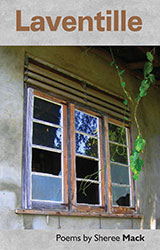Laventille - OUT OF PRINT

Laventille tells the forgotten story of the 1970 Black Power Revolution in Trinidad and Tobago, when for forty-five days an uprising of students, trade unions and the disaffected poor threatened to overthrow the government. The book is a ‘shrine of remembrances’ for the ordinary people behind the headlines. It’s an attempt to stay close to the facts as well as breathing life into the lost and hidden history of the revolution. These poems lament, rage and mourn. But they also offer a song of healing, a celebration of survival, a glimmer of the flames that burn in the hearts of a people still living in slavery’s dark shadow.
Following complaints that some of the poems in Laventille contain phrases borrowed from other poets without due attribution, Smokestack has pulped all the unsold copies of the book. Sheree is currently writing a new version of Laventille, which Smokestack is hoping to publish in 2016.
Sample Poems
Desperadoes
Boots, with his close-knit, salt and pepper afro, swings his dark muscled arms as he searches for a 55-gallon oil drum. Once found, with sledgehammer at the ready, he pounds to the bottom of the drum. They want to drive a nail in the coffin of our aspirations. Boots works up a sweat as he expands the metal into a dish shape. This is sinking the pan, stretching the metal, hammer, hammer, bang bang bang, easing out any aggression, as they try to drive a nail in the coffin of our aspirations. Getting tired now, Boots does not rest. Carrying the drum down to the beach, he builds a fire, letting the drum burn for just a little bit. Then plunges it, red hot, deep into the ocean. He simmers, tempers, making it stronger than it will ever be. Drawing lines on the sunken head, Boots turns the heat on and up, as he bangs out the groove. Like a crowd of police batons, the outline of each note is knocked out. They need to drive a nail in the coffin of our aspirations. Cutting the barrel sides into a short skirt, Boots pong pong pongs the notes in from beneath, creating bubbles on the inside, creating tension, making sure that they are all vibrating at the right pitch. They are driving a nail in the coffin of our aspirations. With a keyboard, Boots tunes each note, tunes each note until they sing and blend with each other. He slaps on some bright paint; blue, yellow or red. Dipping the whole drum in chrome to make it shine, high shine like silver. They will fail to drive a nail in the coffin of our aspirations.
Mexico, 1968
‘If I win, I am an American, not a black American. But if I did something bad, then they would say I am a Negro. We are black and we are proud of being black. Black America will understand what we did tonight.’ Tommie Smith (gold medallist at the 1968 Summer Olympics) With the dust just settling on the track, three men walk out to the podium; two are shoeless. In turn, each bows his head to receive his medal; bronze, silver and gold. One is lynched by a black scarf. One other, by a string of beads. As the Star-Spangled Banner strikes up, they deliver the gesture that will become front-page news around the world. A black-gloved fist punches the air.
'The Long March'
12 March 1970, the March to Caroni by Black Power revolutionaries led by the National Joint Action Committee (NJAC) Arm in arm ten thousand strong, disciplined and silent, with the Northern Range on their backs they start the long hot trek down the old Southern Main Road. The silent, uneasy, undulating Caroni plains lie out ahead. Rumour circulates that the glistening green cane swaying in the breeze holds men, armed and waiting. Deep into their territory, young Indian men and women welcome the crowd with applause, water and juice. Elders stay watching from a distance as rumour runs before them; black men coming to rape their women. In the billowing cane, the sweltering heat, the crowd reach Chaguanas, peacefully. Africans and Indians unite. With night coming on and people exhausted, this is an historic day, an historic moment.
Basil Davis, the First Martyr
12 March 1970, the March to Caroni by Black Power revolutionaries led by the National Joint Action Committee (NJAC) Arm in arm ten thousand strong, disciplined and silent, with the Northern Range on their backs they start the long hot trek down the old Southern Main Road. The silent, uneasy, undulating Caroni plains lie out ahead. Rumour circulates that the glistening green cane swaying in the breeze holds men, armed and waiting. Deep into their territory, young Indian men and women welcome the crowd with applause, water and juice. Elders stay watching from a distance as rumour runs before them; black men coming to rape their women. In the billowing cane, the sweltering heat, the crowd reach Chaguanas, peacefully. Africans and Indians unite. With night coming on and people exhausted, this is an historic day, an historic moment.



